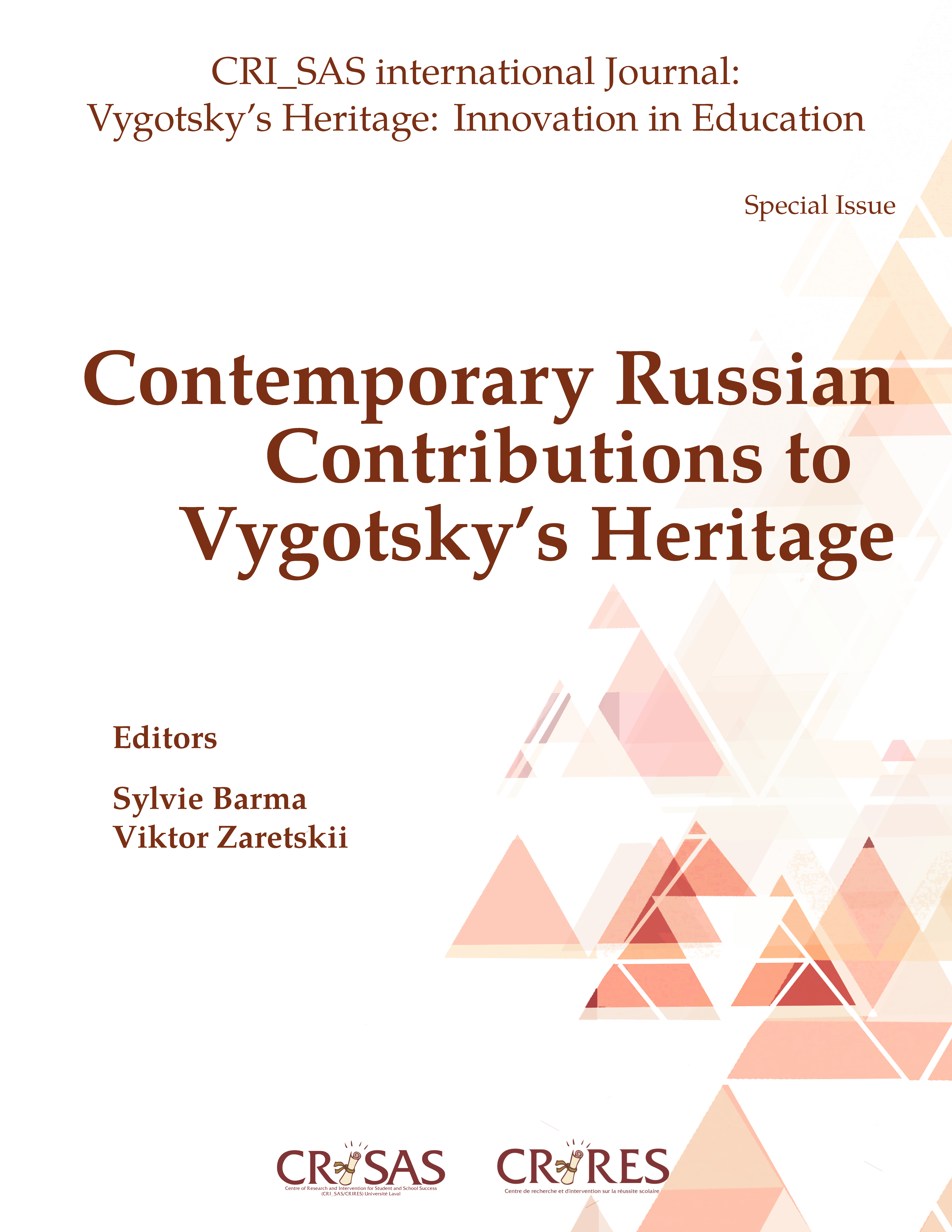A. Beck’s Cognitive Psychotherapy and L. S. Vygotsky’s Cultural - Historical Psychology
DOI:
https://doi.org/10.51657/ric.v4i1.41005Abstract
Last year was celebrated by the international professional community as the 95th jubilee of Aaron Beck - founder of one of the most authoritative branches of modern psychotherapy, the influence of which on the sphere of modern mental healthcare can be compared with the value of Sigmund Freud’s psychoanalysis in the last century. Developmental psychologists celebrate one more anniversary last year - 120 years since the birth of the creator of cultural-historical psychology, founder of Moscow psychological school - Lev S. Vygotsky, who was called “the Mozart in psychology” by a famous British philosopher and methodologist working in the USA Tulmin (1981). Mozart discovered a new epoch in music and died at the prime of creative life - sick, poor and lonely. L. S. Vygotsky in the same way made a revolution in the psychology of the last century and died at the age of 37, persecuted and rejected by the oÿcial Stalinist science, in isolation from the international community.
References
Alekseev, N. G. (1975). Cognitive activity in the formation of conscious decision-making. Moscow: MTPI.
Alekseev, N. G. (2002). Designing conditions for the development of reflexive thinking. Moscow. Access mode:www.circle.ru.
Alford, B. A., & Beck, A. T. (1997). The integrative power of cognitive therapy. New York: Guilford Press.
Bateman, A., & Fonagy, P. (2006). Psychotherapy for borderline personality disorder. Oxford: Oxford University Press.
Beck, A. T. (1976). Cognitive therapy and the emotional disorders. New York: American book.
Beck, A. T., Rush, A. J., Shaw, B. F., & Emery, G. (2003). Cognitive therapy of depression. New York: Guilford Press.
Dührssen, A. (1985). Die “kognitive wende” in der verhaltenstherapie.—eine brücke zur psychoanalyse. Nervenarzt, 56, 479–484.
Gal’perin, P. Y. (1959). Development of research on the formation of mental actions. Psychological Science in the USSR, 1, 441-469.
Kholmogorova, A. B. (1983). Narusheniya refleksivnoi regulyatsii poznavatel’noi deyatel’nosti pri shizofrenii [violations of reflective regulation of cognitive activity in schizophrenia.]. Diss. kand. psikhol. nauk.[Ph. D.(Psychology) diss.]. Moscow.
Kholmogorova, A. B. (2001). Cognitive psychotherapy and domestic psychology of thinking. Moscow Psychotherapeutic Journal, 4, 165-181.
Kholmogorova, A. B. (2011). Integrative psychotherapy of affective spectrum disorders. Moscow: Medpraktika.
Kholmogorova, A. B., & Zaretsky, V. K. (2010). Can russian psychology be useful in solving the problems of modern psychotherapy: reflections after the 20th Congress of the International Federation of Psychotherapy (IFP). Medical psychology(4). http:// medpsy.ru.
Leiman, M. (1992). The concept of sign in thework of vygotsky. Psychology and Psychotherapy: Theory, Research and Practice, 65(3), 209-221.
Leont’ev, A. N. (1978). Activity, consciousness, and personality. Englewood Cliffs, NJ: Prentice-Hall.
Meichenbaum, D. (1977). Cognitive behaviour modification. New York: Plenum.
Meikhenbaum, D. (1998). Evolution of cognitive-behavioral therapy: its origins, principles and examples from clinical practice. In L. M. Krol & M. Class (Eds.), Evolution of psychotherapy. Vol. 2. Moscow.
Ryle, A., & Fonagy, P. (1995). Psychoanalysis, cognitive-analytic therapy, mind and self. British Journal of Psychotherapy, 11(4), 567-574.
Semenov, I. N. (1980). System study of thinking in solving creative problems. Abstract of diss. Cand. psychol. sciences.
Sokolova, E. T. (1989). Samosoznanie i samootsenka pri anomaliyakh lichnosti [Self-awareness and self-esteem of the individual anomalies]. Moscow: MGU Publ.
Sokolova, E. T., & Nikolaeva, V. V. (1995). Osobennosti lichnosti pri pogranichnykh rasstroystvakh i somaticheskikh zabolevaniyakh [Personality traits in borderline disorders and somatic diseases]. Moscow: SvR-Argus.
Tulmin, S. (1981). Motsart v psikhologii [mozart in psychology]. Voprosy filosofii [Questions of Psychology](10),127–137.
Vygotsky, L. S. (1982a). Consciousness as a problem of behavioral psychology (Vol. 1). Moscow: Coll. Op.
Vygotsky, L. S. (1982b). Myshlenie i rech’ [Thinking and speech], Vol. 2. Moscow: Pedagogika.
Vygotsky, L. S. (1983). Problema umstvennoy otstalosti [The problem of mental retardation]. In Works: in 6 volumes (Vol. 5, pp. 231–256). Moscow: Pedagogika.
Wertsch, J. V. (1979). From social interaction to higher psychological processes. A clarification and application of vygotsky’s theory. Human development, 22(1), 1-22.
Zaretskii, V. K. (1984). Dinamika urovnevoi organizatsii myshleniya pri reshenii tvorcheskikh zadach: Avtoref. diss. . . . kand. psikhol. nauk [the dynamics of organising thinking in creative problem solving: Ph.d. (psychology) thesis]. Moscow.
Zaretskii, V. K., & Kholmogorova, A. B. (1983). Smyslovaya regulyatsiya resheniya tvorcheskikh zadach [Meaning regulation of creative problem solving]. In Issledovaniya problem psikhologii tvorchestva [Studying the issues of psychology of creativity] (pp. 62– 100). Moscow: Nauka.
Zeigarnik, B. V., Kholmogorova, A. B., & Mazur, E. S. (1989). Self-regulation of behavior in norm and pathology. Psychological journal, 10(2), 122–132.
Zeygarnik, B. V. (1986). Patopsikhologiya [pathopsychology]. Moscow: Moscow University Publ.
Zeygarnik, B. V., & Kholmogorova, A. B. (1985). Violation of self-regulation of cognitive activity in patients with schizophrenia. Journal ofNeuropathology and Psychiatry, 85(12),1813-1819.
Downloads
Published
Issue
Section
License
Copyright (c) 2017 Alla B. Kholmogorova

This work is licensed under a Creative Commons Attribution-NonCommercial-NoDerivatives 4.0 International License.

